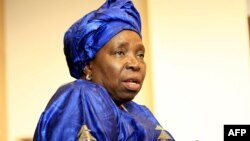WASHINGTON —
The African Union Commission (AUC) has launched a historic Africa-wide campaign to end child marriage on the continent.
The campaign focuses on policy action and raising continental awareness. Member states would be expected to follow and implement legal frameworks that protect children.
Speaking at the launch in Addis Ababa, Ethiopia, on Thursday, AUC chairperson Dr. Nkosazana Dlamini-Zuma said child marriage cannot be left unaddressed.
She said the continent cannot afford to let this tradition go unchallenged.
“We cannot down play or neglect the harmful practice of child marriage as it has long term and devastating effects on these girls whose health is at risk and at worst leading to death due to child birth and other complications,” said Dlamini-Zuma.
Most girls married at a young age often have mental anguish, suffer endless health problems, including high maternal and child mortality rates, premature death and obstetric fistula, due to early pregnancies. They are also less likely to get an education.
Most of the girls come from poor families and rural areas where they cannot oppose family and community cultural norms.
Experts say if nothing is done in the next decade to curb child marriage, at least 14.2 million girls below the age of 18 will be forced into marriage each year by their parents in developing countries against their will.
If the trend continues, the number of girls under 15 years giving birth in Africa is expected to rise from two million to three million by 2030.
The AU says the costs of inaction, in terms of rights unrealized, shortened personal potential and lost developmental opportunities, far outweigh the costs of interventions.
Bineta Diop, AUC Special Envoy for Women, Peace and Security, emphasized that educating girls will help improve Africa’s socio-economic development, adding no child’s education should be interrupted at any time because of marriage.
She said despite challenges, child marriage rates are declining as a result of local action in most African countries.
The End Child Marriage campaign is being done in co-operation with African governments, the United Nations Children's Education Fund (UNICEF) and civil society organizations.
“Child marriage remains a fundamental human rights violation and is a symptom of the prevailing gender inequalities all of us are fighting so hard to prevent,” UNICEF Deputy Executive Director, Martin Mogwanja, said.
Zimbabwean human rights lawyer, Nyaradzai Gumbonzvanda, was named a Goodwill Ambassador for the AU campaign. Gumbonzvanda is currently the general secretary of the World Young Women's Christian Association (YWCA).
The campaign focuses on policy action and raising continental awareness. Member states would be expected to follow and implement legal frameworks that protect children.
Speaking at the launch in Addis Ababa, Ethiopia, on Thursday, AUC chairperson Dr. Nkosazana Dlamini-Zuma said child marriage cannot be left unaddressed.
She said the continent cannot afford to let this tradition go unchallenged.
“We cannot down play or neglect the harmful practice of child marriage as it has long term and devastating effects on these girls whose health is at risk and at worst leading to death due to child birth and other complications,” said Dlamini-Zuma.
Most girls married at a young age often have mental anguish, suffer endless health problems, including high maternal and child mortality rates, premature death and obstetric fistula, due to early pregnancies. They are also less likely to get an education.
Most of the girls come from poor families and rural areas where they cannot oppose family and community cultural norms.
Experts say if nothing is done in the next decade to curb child marriage, at least 14.2 million girls below the age of 18 will be forced into marriage each year by their parents in developing countries against their will.
If the trend continues, the number of girls under 15 years giving birth in Africa is expected to rise from two million to three million by 2030.
The AU says the costs of inaction, in terms of rights unrealized, shortened personal potential and lost developmental opportunities, far outweigh the costs of interventions.
Bineta Diop, AUC Special Envoy for Women, Peace and Security, emphasized that educating girls will help improve Africa’s socio-economic development, adding no child’s education should be interrupted at any time because of marriage.
She said despite challenges, child marriage rates are declining as a result of local action in most African countries.
The End Child Marriage campaign is being done in co-operation with African governments, the United Nations Children's Education Fund (UNICEF) and civil society organizations.
“Child marriage remains a fundamental human rights violation and is a symptom of the prevailing gender inequalities all of us are fighting so hard to prevent,” UNICEF Deputy Executive Director, Martin Mogwanja, said.
Zimbabwean human rights lawyer, Nyaradzai Gumbonzvanda, was named a Goodwill Ambassador for the AU campaign. Gumbonzvanda is currently the general secretary of the World Young Women's Christian Association (YWCA).




